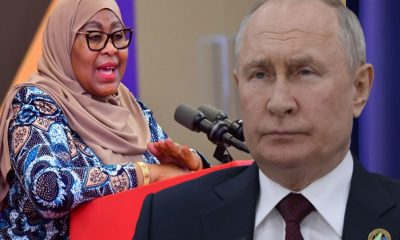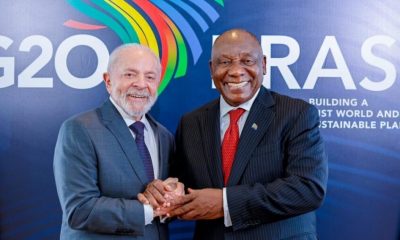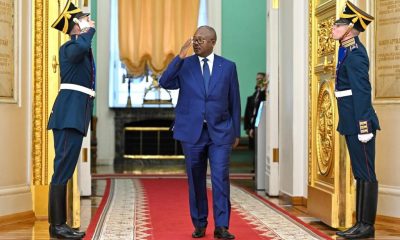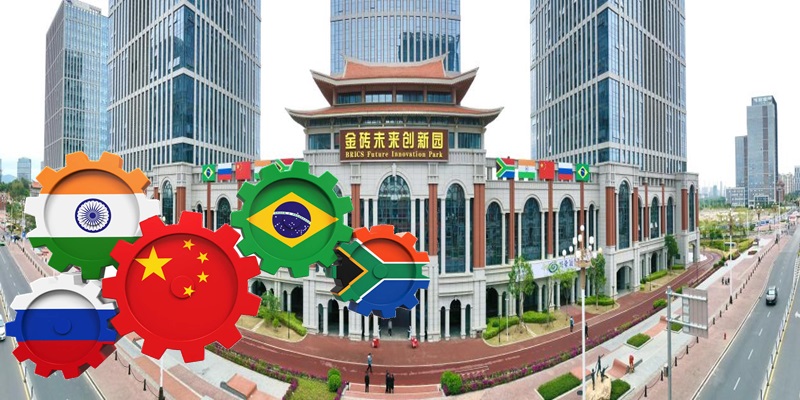World
South Africa Values its Relations with Russia and BRICS
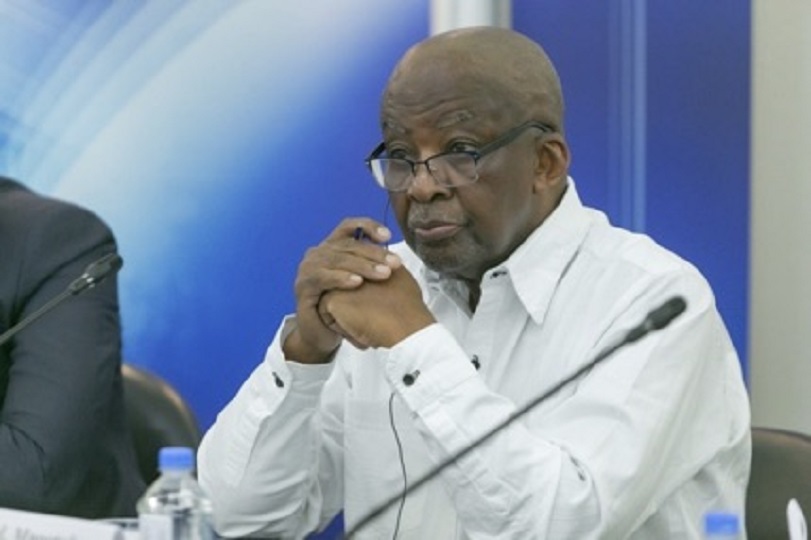
By Kestér Kenn Klomegâh
This insightful interview offers an understanding of the current relations between South Africa and Russia and BRICS. It focuses on bilateral economic cooperation between South Africa and Russia and some aspects of the BRICS.
With an estimated 58 million population, South Africa is the 25th largest country in the world. It has friendly relations dating from the Soviet times and now with the Russian Federation. It joined BRICS, an organisation of five emerging economies, in December 2010 in line with the country’s foreign policy to strengthen South-South relations.
Ambassador Extraordinary and Plenipotentiary of the Republic of South Africa to the Russian Federation and the Republic of Belarus, Mzuvukile Maqetuka, who has been in this current post since 2021, gave this interview to our media executive Kestér Kenn Klomegâh in Moscow. Here are the interview excerpts:
First, what are your Government’s position and your thoughts on the emerging world order? Do you think the absolute neutral position by a majority of African countries helps push the evolutionary process of this new world order?
South Africa’s neutral position is consistent in all military conflicts around the world, and the international community needs to work together to bring peace.
South Africa is committed to the articles of the United Nations (UN) Charter, including the principle that all members shall settle their international disputes by peaceful means. Since the dawn of democracy in South Africa almost 30 years ago, we have called for the reform of the United Nations and multilateral organisations to make such structures more representative, inclusive of African representation.
South Africa is a sovereign state governed by a democratic Constitution and committed to the consistent application of international law. We will continue to fulfil our obligations in terms of the various international agreements and treaties to which we are signatories.
In the Russia-Ukraine conflict, the international community needs to achieve a cessation of hostilities urgently and to prevent further loss of life and displacement of civilians in Ukraine. It needs to support meaningful dialogue towards lasting peace, ensuring all nations’ security and stability. We support the principle that members should refrain from the threat or use of force against other states’ territorial integrity or political independence. The South African position seeks to contribute to the creation of conditions that make the achievement of a durable resolution of the conflict possible.
What are the key results from the last June meeting of the Russia-South African Business Council at the Russian Chamber of Commerce and Industry? What challenges have been identified as hindering economic cooperation between the two countries?
Russia and South Africa are known to be closely cooperating in the mining and energy sectors. What efforts is your country making to diversify investment opportunities into other sectors for Russian business people?
In what areas do you think the Russia-South African bilateral relations could be improved, and what do you suggest to be done, promoting relations both ways?
South Africa–Russia Business Council submits the reports of their meetings to the Joint Intergovernmental Committee on Trade and Economic Cooperation (ITEC) chaired by the Minister of International Relations and Cooperation of South Africa and the Minister of Natural Resources and Environment of the Russian Federation. The last session of ITEC was held in Pretoria on 30 March 2023.
Russia and South Africa are focusing on intensifying trade relations and economic development. Both countries aspire to strengthen cooperation within the Russian-South African business community.
One of the current priorities of the SA-Russia Business Council is to develop a joint programme of cooperation which would involve relevant authorities on both sides to facilitate business-to-business meetings in identified sectors.
Some of the subcommittees in the Business Council continue to perform exceptionally well. For example, the Agricultural Subcommittee has maintained high levels of agricultural exports to the Russian Federation. South African citrus fruit exports to Russia are of top quality and fall within the top 3 of citrus fruit exporter countries for the Russian market.
Another example is South African wines exported to the Russian Federation, such as KWV wines which have recently achieved a spot in the top 50 and are one of four South African wine brands in the “World’s Most Admired Wine Brand in Africa & Middle East”.
According to the South African Department of Trade and Competition (dtic) statistics, total trade (export + import) between South Africa and Russia in March 2023 was R638,945,978 South African Rand.
In March 2023, total exports from South Africa to Russia were R392,335,607. In comparison to February 2023, the total exports increased by 38%. In comparison to the same period of 2022 (March 2022), exports increased by 298%.
Now that you have arrived as the South African ambassador, what would you say are your Government’s priorities then? What are, generally, the investment opportunities for external countries and foreign investors in South Africa?
South Africa has one of the biggest economies on the continent, and it is still rapidly developing. South Africa is the most diversified as well as the most industrialised economy on the continent.
The South African economy is essentially based on private enterprise, but the state participates in many ways. Economic policy has been aimed primarily at sustaining growth and achieving a measure of industrial self-sufficiency. Agriculture is of major importance to South Africa. It produces significant exports and contributes greatly to the domestic economy.
South Africa is rich in a variety of minerals. In addition to diamonds and gold, the country also contains iron ore, platinum, manganese, chromium, copper, uranium, silver, beryllium, and titanium reserves. Not many deposits of petroleum have been found that may be commercially exploitable, but there are moderate quantities of natural gas located off the southern coast, and synthetic fuel is made from coal at two large plants in the provinces of Free State and Mpumalanga. South Africa is the world’s largest producer of platinum and chromium, mined at centres such as Rustenburg and Steelpoort in the northeast and becoming increasingly significant economically.
The major manufacturing sectors are food processing and the production of textiles, metals, and chemicals. Agriculture and fisheries provide the basis for substantial activity in meat, fish, and fruit canning, sugar refining, and other processing; more than half of these products are exported.
A large and complex chemical industry has developed from early beginnings in the manufacture of explosives for use in mining. A coal-based petrochemical industry produces a wide range of plastics, resins, and industrial chemicals.
South Africa has a well-developed financial system centred on the South African Reserve Bank, which is the sole issuing authority for the rand, the national currency. There are many registered banking institutions, a number of which concentrate on commercial banking, as well as merchant, savings, investment, and discount banks. One such bank, the Development Bank of Southern Africa, is a quasi-governmental company created to promote development projects. Private pensions, provident funds, and more than two dozen insurance companies play significant roles in the financial sector.
Tourism is becoming increasingly important to South Africa’s economy, and this sector, which is an economic driver, is finally making a positive recovery post-Covid-19. While the majority of tourists still come from African countries, an increasing number of arrivals are from Europe, the Americas and Russia. Since SA and Russia signed the visa waiver agreement in 2017, which allows for 90-day visa-free travel between our two countries, we have seen a steady increase in Russian tourists visiting South Africa.
South Africa welcomed and fully supported the adoption by African nations of the African Continental Free Trade Agreement (AfCFTA), which we believe will contribute tremendously in pursuit of the economic integration of our continent towards the attainment of our vision: Agenda 2063, the Africa We Want.
Through the implementation of AfCFTA, African states are determined to increase manufacturing and industrial capacity so that we trade in African goods and products produced in Africa.
As the largest African investor in other African countries, South Africa hopes to build on this and mobilise resources for industrial investment.
How comparable is Russia to those external investors in South Africa? Why are China and India so popular with economic diplomacy there in your country?
South Africa was the first member of an expanded BRICS in 2010 when the group of four (Brazil, Russia, India and China) was already holding its 3rd Summit in China that year. We consider it an honour to have been invited to form part of this partnership of leading emerging markets and developing countries.
Together, the Federative Republic of Brazil, the Russian Federation, the Republic of India, the People’s Republic of China and the Republic of South Africa represent over 42% of the global population, 30% of the world’s territory, 23% of GDP and 18% of global trade.
The BRICS partnership has grown in scope and depth, with BRICS members exploring practical cooperation in a spirit of openness and solidarity to find mutual interests and common values. Around 150 meetings are held annually across the three pillars of BRICS cooperation: political and security cooperation, financial and economic cooperation, and cultural and people-to-people cooperation. Over 30 agreements and memoranda of understanding provide a legal foundation for cooperation in areas as diverse as the Contingent Reserve Arrangement, customs, tax, interbank cooperation, culture, science, technology and innovation, agricultural research, energy efficiency, competition policy and diplomatic academies.
The South African Minister of International Relations and Cooperation, Dr Naledi Pandor, hosted the most recent Meeting of BRICS Ministers of Foreign Affairs and International Relations on 1 June 2023 in Cape Town. The mid-term meeting provided an opportunity for BRICS Foreign Ministers to reflect on regional and global developments. The ministerial meeting was preceded by the meeting of Sherpas and Sous-Sherpas from 29 – 30 May 2023, and the Russian delegation attended all these meetings in Cape Town; Minister Lavrov was leading the delegation.
As chair of BRICS, South Africa practices the policy of inclusive engagement and invited 15 Foreign Ministers from Africa and the global south to a “Friends of BRICS” meeting held on 2 June 2023.
From 22 to 24 August 2023, all BRICS Leaders are expected to attend the 15th BRICS Summit in South Africa at the Sandton Convention Centre (SCC) in Johannesburg, Gauteng.
BRICS Leaders will engage with business during the BRICS Business Forum and engage with the New Development Bank, BRICS Business Council and other mechanisms during the Summit. South Africa will also continue its Outreach to Leaders from Africa and the global South and hold a BRICS Outreach and BRICS Plus Dialogue during the 15th BRICS Summit.
Do you also think that Russia can engage in the transfer of its science and technology in different sectors to Africa? What else do you have on the agenda in the Russian Federation?
In May 2023, a delegation from South Africa’s Department of Science and Innovation (DSI) and the Technology Innovation Agency (TIA) travelled to Moscow to attend the annual Skolkovo Startup Village. During the delegation’s visit to Russia, Memoranda of Understanding were signed in the field of innovation and technology.
TIA is a national public entity in South Africa that serves as the key institutional intervention to bridge the innovation chasm between research and development from higher education institutions, science councils, public entities, and the private sector, and commercialisation. The Organization’s focus is on technological development, from proof of concept to pre-commercialisation.
The Russian Federation has identified the expansion of science and technology cooperation, as spearheaded by the Russian Academy of Science, as an important part of its renewed engagement with the African Continent; this is witnessed in the theme of the Economic and Humanitarian Forum that forms part of the 2nd Russia-Africa Summit scheduled for July 2023, i.e., Technology and Security for Sovereign Development that Benefits People. The Summit is scheduled to discuss very important themes, including Infrastructure, Innovation, and Improvements to the Urban Environment; Nuclear Technologies for African Development; Building Independent Systems for Assessing and Promoting National Science Programmes in Russia and Africa: Opportunities for Mutual Support; Achieving Technological Sovereignty Through Industrial Cooperation; Improving the Reliability of Africa’s Energy Infrastructure with Low Emission Technologies; How Russian Digital Technologies Can Boost Africa’s Industrial Potential; Bringing Russian Prospecting and Development Technologies to Africa; Effective Healthcare Cooperation: Technologies, Innovations, Human Capital; Bringing Russian Shipbuilding to Africa: A Modern Fleet to Develop the Entire Continent; An Emerging Global Order as Seen by African and Russian Researchers: Alternatives to Western Models.
What is your assessment of the possibilities of a joint, coordinated foreign trade policy within the BRICS? What do you think about the proposal to introduce national currency trade settlement arrangements within the BRICS?
The South African Reserve Bank will give consideration to possible national currency trade settlement arrangements amongst BRICS countries following extensive and detailed work on the matter.
Key questions will include its intended arrangement, and consideration will be given to any related risk, including, though not limited to, any sanctions risk to South Africa.
World
AfBD, AU Renew Call for Visa-Free Travel to Boost African Economic Growth

By Adedapo Adesanya
The African Development Bank (AfDB) and the African Union have renewed their push for visa-free travel to accelerate Africa’s economic transformation.
The call was reinforced at a High-Level Symposium on Advancing a Visa-Free Africa for Economic Prosperity, where African policymakers, business leaders, and development institutions examined the need for visa-free travel across the continent.
The consensus described the free movement of people as essential to unlocking Africa’s economic transformation under the African Continental Free Trade Area (AfCFTA).
The symposium was co-convened by AfDB and the African Union Commission on the margins of the 39th African Union Summit of Heads of State and Government in Addis Ababa.
The participants framed mobility as the missing link in Africa’s integration agenda, arguing that while tariffs are falling under AfCFTA, restrictive visa regimes continue to limit trade in services, investment flows, tourism, and labour mobility.
On his part, Mr Alex Mubiru, Director General for Eastern Africa at the African Development Bank Group, said that visa-free travel, interoperable digital systems, and integrated markets are practical enablers of enterprise, innovation, and regional value chains to translate policy ambitions into economic activity.
“The evidence is clear. The economics support openness. The human story demands it,” he told participants, urging countries to move from incremental reforms to “transformative change.”
Ms Amma A. Twum-Amoah, Commissioner for Health, Humanitarian Affairs and Social Development at the African Union Commission, called for faster implementation of existing continental frameworks.
She described visa openness as a strategic lever for deepening regional markets and enhancing collective responses to economic and humanitarian crises.
Former AU Commission Chairperson, Ms Nkosazana Dlamini-Zuma, reiterated that free movement is central to the African Union’s long-term development blueprint, Agenda 2063.
“If we accept that we are Africans, then we must be able to move freely across our continent,” she said, urging member states to operationalise initiatives such as the African Passport and the Free Movement of Persons Protocol.
Ghana’s Trade and Industry Minister, Mrs Elizabeth Ofosu-Adjare, shared her country’s experience as an early adopter of open visa policies for African travellers, citing increased business travel, tourism, and investor interest as early dividends of greater openness.
The symposium also reviewed findings from the latest Africa Visa Openness Index, which shows that more than half of intra-African travel still requires visas before departure – seen by participants as a significant drag on intra-continental commerce.
Mr Mesfin Bekele, Chief Executive Officer of Ethiopian Airlines, called for full implementation of the Single African Air Transport Market (SAATM), saying aviation connectivity and visa liberalisation must advance together to enable seamless travel.
Regional representatives, including Mr Elias Magosi, Executive Secretary of the Southern Africa Development Community, emphasised the importance of building trust through border management and digital information-sharing systems.
Ms Gabby Otchere Darko, Executive Chairman of the Africa Prosperity Network, urged governments to support the “Make Africa Borderless Now” campaign, while tourism campaigner Ras Mubarak called for more ratifications of the AU Free Movement of Persons protocol.
Participants concluded that achieving a visa-free Africa will require aligning migration policies, digital identity systems, and border infrastructure, alongside sustained political commitment.
World
Nigeria Exploring Economic Potential in South America, Particularly Brazil

By Kestér Kenn Klomegâh
In this interview, Uche Uzoigwe, Secretary-General of NIDOA-Brazil, discusses the economic potential in South America, particularly Brazil, and investment incentives for Brazilian corporate partners for the Federal Republic of Nigeria (FRN). Follow the discussion here:
How would you assess the economic potential in the South American region, particularly Brazil, for the Federal Republic of Nigeria? What investment incentives does Nigeria have for potential corporate partners from Brazil?
As the Secretary of NIDOA Brazil, my response to the questions regarding the economic potentials in South America, particularly Brazil, and investment incentives for Brazilian corporate partners would be as follows:
Brazil, as the largest economy in South America, presents significant opportunities for the Federal Republic of Nigeria. The country’s diverse economy is characterised by key sectors such as agriculture, mining, energy, and technology. Here are some factors to consider:
- Natural Resources: Brazil is rich in natural resources like iron ore, soybeans, and biofuels, which can be beneficial to Nigeria in terms of trade and resource exchange.
- Growing Agricultural Sector: With a well-established agricultural sector, Brazil offers potential collaboration in agri-tech and food security initiatives, which align with Nigeria’s goals for agricultural development.
- Market Size: Brazil boasts a large consumer market with a growing middle class. This represents opportunities for Nigerian businesses looking to export goods and services to new markets.
- Investment in Infrastructure: Brazil has made significant investments in infrastructure, which could create opportunities for Nigerian firms in construction, engineering, and technology sectors.
- Cultural and Economic Ties: There are historical and cultural ties between Nigeria and Brazil, especially considering the African diaspora in Brazil. This can facilitate easier business partnerships and collaborations.
In terms of investment incentives for potential corporate partners from Brazil, Nigeria offers several attractive incentives for Brazilian corporate partners, including:
- Tax Incentives: Various tax holidays and concessions are available under the Nigerian government’s investment promotion laws, particularly in key sectors like agriculture, manufacturing, and technology.
- Repatriation of Profits: Brazil-based companies investing in Nigeria can repatriate profits without restrictions, thus enhancing their financial viability.
- Access to the African Market: Investment in Nigeria allows Brazilian companies to access the broader African market, benefiting from Nigeria’s membership in regional trade agreements such as ECOWAS.
- Free Trade Zones: Nigeria has established free trade zones that offer companies the chance to operate with reduced tariffs and fewer regulatory burdens.
- Support for Innovation: The Nigerian government encourages innovation and technology transfer, making it attractive for Brazilian firms in the tech sector to collaborate, particularly in fintech and agriculture technology.
- Collaborative Ventures: Opportunities exist for joint ventures with local firms, leveraging local knowledge and networks to navigate the business landscape effectively.
In conclusion, fostering a collaborative relationship between Nigeria and Brazil can unlock numerous economic opportunities, leading to mutual growth and development in various sectors. We welcome potential Brazilian investors to explore these opportunities and contribute to our shared economic goals.
In terms of this economic cooperation and trade, what would you say are the current practical achievements, with supporting strategies and systemic engagement from NIDOA?
As the Secretary of NIDOA Brazil, I would highlight the current practical achievements in economic cooperation and trade between Nigeria and Brazil, alongside the supporting strategies and systemic engagement from NIDOA.
Here are some key points:
Current Practical Achievements
- Increased Bilateral Trade: There has been a notable increase in bilateral trade volume between Nigeria and Brazil, particularly in sectors such as agriculture, textiles, and technology. Recent trade agreements and discussions have facilitated smoother trade relations.
- Joint Ventures and Partnerships: Successful joint ventures have been established between Brazilian and Nigerian companies, particularly in agriculture (e.g., collaboration in soybean production and agricultural technology) and energy (renewables, oil, and gas), demonstrating commitment to mutual development.
- Investment in Infrastructure Development: Brazilian construction firms have been involved in key infrastructure projects in Nigeria, contributing to building roads, bridges, and facilities that enhance connectivity and economic activity.
- Cultural and Educational Exchange Programs: Programs facilitating educational exchange and cultural cooperation have led to strengthened ties. Brazilian universities have partnered with Nigerian institutions to promote knowledge transfer in various fields, including science, technology, and arts.
Supporting Strategies
- Strategic Trade Dialogue: NIDOA has initiated regular dialogues between trade ministries of both nations to discuss trade barriers, potential markets, and cooperative opportunities, ensuring both countries are aligned in their economic goals.
- Investment Promotion Initiatives: Targeted initiatives have been established to promote Brazil as an investment destination for Nigerian businesses and vice versa. This includes showcasing success stories at international trade fairs and business forums.
- Capacity Building and Technical Assistance: NIDOA has offered capacity-building programs focused on enhancing Nigeria’s capabilities in agriculture and technology, leveraging Brazil’s expertise and sustainable practices.
- Policy Advocacy: Continuous advocacy for favourable trade policies has been a key focus for NIDOA, working to reduce tariffs and promote economic reforms that facilitate investment and trade flows.
Systemic Engagement
- Public-Private Partnerships (PPPs): Engaging the private sector through PPPs has been essential in mobilising resources for development projects. NIDOA has actively facilitated partnerships that leverage both public and private investments.
- Trade Missions and Business Delegations: Organised trade missions to Brazil for Nigerian businesses and vice versa, allowing for direct engagement with potential partners, fostering trust and opening new channels for trade.
- Monitoring and Evaluation: NIDOA implements a rigorous monitoring and evaluation framework to assess the impact of various initiatives and make necessary adjustments to strategies, ensuring effectiveness in achieving economic cooperation goals.
Through these practical achievements, supporting strategies, and systemic engagement, NIDOA continues to play a pivotal role in enhancing economic cooperation and trade between Nigeria and Brazil. By fostering collaboration and leveraging shared resources, we aim to create a sustainable and mutually beneficial economic environment that promotes growth for both nations.
Do you think the changing geopolitical situation poses a number of challenges to connecting businesses in the region with Nigeria, and how do you overcome them in the activities of NIDOA?
The changing geopolitical situation indeed poses several challenges for connecting businesses in the South American region, particularly Brazil, with Nigeria. These challenges include trade tensions, shifting alliances, currency fluctuations, and varying regulatory environments. Below, I will outline some of the specific challenges and how NIDOA works to overcome them:
Current Challenges
- No Direct Flights: This challenge is obviously explicit. Once direct flights between Brazil and Nigeria become active, and hopefully this year, a much better understanding and engagement will follow suit.
- Trade Restrictions and Tariffs: Increasing trade protectionism in various regions can lead to higher tariffs and trade barriers that hinder the movement of goods between Brazil and Nigeria.
- Currency Volatility: Fluctuations in the value of currencies can complicate trade agreements, pricing strategies, and overall financial planning for businesses operating in both Brazil and Nigeria.
- Different regulatory frameworks and compliance requirements in both countries can create challenges for businesses aiming to navigate these systems efficiently.
- Supply Chain Disruptions: Changes in global supply chains due to geopolitical factors may disrupt established networks, impacting businesses relying on imports and exports between the two nations.
Overcoming Challenges through NIDOA.
NIDOA actively engages in discussions with both the Brazilian and Nigerian governments to advocate for favourable trade policies and agreements that reduce tariffs and improve trade conditions. This year in October, NIDOA BRAZIL holds its TRADE FAIR in São Paulo, Brazil.
What are the popular sentiments among the Nigerians in the South American diaspora? As the Secretary-General of the NIDOA, what are your suggestions relating to assimilation and integration, and of course, future perspectives for the Nigerian diaspora?
As the Secretary-General of NIDOA, I recognise the importance of understanding the sentiments among Nigerians in the South American diaspora, particularly in Brazil.
Many Nigerians in the diaspora take pride in their cultural roots, celebrating their heritage through festivals, music, dance, and culinary traditions. This cultural expression fosters a sense of community and belonging.
While many individuals embrace their new environments, they often face challenges related to cultural differences, language barriers, and social integration, which can lead to feelings of isolation.
Many express optimism about opportunities in education, business, and cultural exchange, viewing their presence in South America as a chance to expand their horizons and contribute to economic activities both locally and back in Nigeria.
Sentiments regarding acceptance vary; while some Nigerians experience warmth and hospitality, others encounter prejudice or discrimination, which can impact their overall experience in the host country. NIDOA BRAZIL has encouraged the formation of community organisations that promote networking, cultural exchange, and social events to foster a sense of belonging and support among Nigerians in the diaspora. There are currently two forums with over a thousand Nigerian members.
Cultural Education and Awareness Programs: NIDOA BRAZIL organises cultural education programs that showcase Nigerian heritage to local communities, promoting mutual understanding and appreciation that can facilitate smoother integration.
Language and Skills Training: NIDOA BRAZIL provides language courses and skills training programs to help Nigerians, especially students in tertiary institutions, adapt to their new environment, enhancing communication and employability within the host country.
Engaging in Entrepreneurship: NIDOA BRAZIL supports the entrepreneurial spirit among Nigerians in the diaspora by facilitating access to resources, mentorship, and networks that can help them start businesses and create economic opportunities.
Through its AMBASSADOR’S CUP COMPETITION, NIDOA Brazil has engaged students of tertiary institutions in Brazil to promote business projects and initiatives that can be implemented in Nigeria.
NIDOA BRAZIL also pushes for increased tourism to Brazil since Brazil is set to become a global tourism leader in 2026, with a projected 10 million international visitors, driven by a post-pandemic rebound, enhanced air connectivity, and targeted marketing strategies.
Brazil’s tourism sector is poised for a remarkable milestone in 2026, as the country expects to welcome over 10 million international visitors—surpassing the previous record of 9.3 million in 2025. This expected surge represents an ambitious leap, nearly doubling the country’s foreign-arrival numbers within just four years, a feat driven by a combination of pent-up global demand, strategic air connectivity improvements, and a highly targeted marketing campaign.
World
African Visual Art is Distinguished by Colour Expression, Dynamic Form—Kalalb

By Kestér Kenn Klomegâh
In this insightful interview, Natali Kalalb, founder of NAtali KAlalb Art Gallery, discusses her practical experiences of handling Africa’s contemporary arts, her professional journey into the creative industry and entrepreneurship, and also strategies of building cultural partnership as a foundation for Russian-African bilateral relations. Here are the interview excerpts:
Given your experience working with Africa, particularly in promoting contemporary art, how would you assess its impact on Russian-African relations?
Interestingly, my professional journey in Africa began with the work “Afroprima.” It depicted a dark-skinned ballerina, combining African dance and the Russian academic ballet tradition. This painting became a symbol of cultural synthesis—not opposition, but dialogue.
Contemporary African art is rapidly strengthening its place in the world. By 2017, the market was growing so rapidly that Sotheby launched its first separate African auction, bringing together 100 lots from 60 artists from 14 foreign countries, including Algeria, Ghana, Mali, Nigeria, Senegal, and others. That same year during the Autumn season, Louis Vuitton Foundation in Paris hosted a major exhibition dedicated to African art. According to Artnet, sales of contemporary African artists reached $40 million by 2021, a 434% increase in just two years. Today, Sotheby holds African auctions twice a year, and in October 2023, they raised $2.8 million.
In Russia, this process manifests itself through cultural dialogue: exhibitions, studios, and educational initiatives create a space of trust and mutual respect, shaping the understanding of contemporary African art at the local level.
Do you think geopolitical changes are affecting your professional work? What prompted you to create an African art studio?
The international context certainly influences cultural processes. However, my decision to work with African themes was not situational. I was drawn to the expressiveness of African visual language—colour, rhythm, and plastic energy. This theme is practically not represented systematically and professionally in the Russian art scene.
The creation of the studio was a step toward establishing a sustainable platform for cultural exchange and artistic dialogue, where the works of African artists are perceived as a full-fledged part of the global cultural process, rather than an exotic one.
To what extent does African art influence Russian perceptions?
Contemporary African art is gradually changing the perception of the continent. While previously viewed superficially or stereotypically, today viewers are confronted with the depth of artistic expression and the intellectual and aesthetic level of contemporary artists.
Portraits are particularly impactful: they allow us to see not just an abstract image of a “continent,” but a concrete personality, character, and inner dignity. Global market growth data and regular auctions create additional trust in African contemporary art and contribute to its perception as a mature and valuable movement.
Does African art reflect lifestyle and fashion? How does it differ from Russian art?
African art, in my opinion, is at its peak in everyday culture—textiles, ornamentation, bodily movement, rhythm. It interacts organically with fashion, music, interior design, and the urban environment. The Russian artistic tradition is historically more academic and philosophical. African visual art is distinguished by greater colour expression and dynamic form. Nevertheless, both cultures are united by a profound symbolic and spiritual component.
What feedback do you receive on social media?
Audience reactions are generally constructive and engaging. Viewers ask questions about cultural codes, symbolism, and the choice of subjects. The digital environment allows for a diversity of opinions, but a conscious interest and a willingness to engage in cultural dialogue are emerging.
What are the key challenges and achievements of recent years?
Key challenges:
- Limited expert base on African contemporary art in Russia;
- Need for systematic educational outreach;
- Overcoming the perception of African art as exclusively decorative or ethnic.
Key achievements:
- Building a sustainable audience;
- Implementing exhibition and studio projects;
- Strengthening professional cultural interaction and trust in African
contemporary art as a serious artistic movement.
What are your future prospects in the context of cultural diplomacy?
Looking forward, I see the development of joint exhibitions, educational programs, and creative residencies. Cultural diplomacy is a long-term process based on respect and professionalism. If an artistic image is capable of uniting different cultural traditions in a single visual space, it becomes a tool for mutual understanding.
-

 Feature/OPED6 years ago
Feature/OPED6 years agoDavos was Different this year
-
Travel/Tourism10 years ago
Lagos Seals Western Lodge Hotel In Ikorodu
-

 Showbiz3 years ago
Showbiz3 years agoEstranged Lover Releases Videos of Empress Njamah Bathing
-

 Banking8 years ago
Banking8 years agoSort Codes of GTBank Branches in Nigeria
-

 Economy3 years ago
Economy3 years agoSubsidy Removal: CNG at N130 Per Litre Cheaper Than Petrol—IPMAN
-

 Banking3 years ago
Banking3 years agoSort Codes of UBA Branches in Nigeria
-

 Banking3 years ago
Banking3 years agoFirst Bank Announces Planned Downtime
-

 Sports3 years ago
Sports3 years agoHighest Paid Nigerian Footballer – How Much Do Nigerian Footballers Earn






